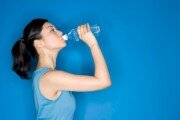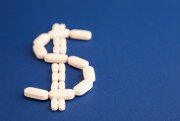Stroke: Folate Deficiency May Increase Stroke Risk
Women don’t get enough folate. And the results can be disastrous twice over. According to a recent survey by US health charity March of Dimes, most women of child-bearing age are not taking supplements of folic acid (the synthetic form of folate, a B vitamin).
When women have an adequate intake of folate, risk of birth defects drops off sharply. But the March of Dimes survey reveals that only one in three child-bearing age women take the recommended 400 micrograms (mcg) of folic acid supplements daily. The reason most women offered for not taking a supplement: They forgot.
I hope women who have passed child-bearing age are not so forgetful, because folic acid supplements may help prevent one of the most feared of all health conditions: stroke. And that goes for men, too.
Folate shown to reduce stroke risk
There are two basic types of stroke: ischaemic and haemorrhagic. Ischaemic stroke occurs when an artery that leads to the brain is blocked, and a haemorrhagic stroke is the result of a ruptured blood vessel in the brain. Approximately 80 percent of all strokes are ischaemic.
In the e-alert ‘How the B vitamins can help lower your stroke risk’ (9/2/04), I told you about a Northwestern University (NU) study in which the medical records and dietary information for more than 43,000 healthy men were closely monitored over a 14-year period. Researchers found that the highest intake of folate was associated with an almost 30 percent lower risk of ischaemic stroke compared to men who had the lowest folate intake. Higher intake of vitamin B-12 was also associated with a reduced ischaemic stroke risk. Rates of haemorrhagic stroke were apparently unaffected by either of these vitamins.
Okay, hold that thought while we take a quick look at another study published in a recent issue of the journal Stroke.
Researchers at Umea University Hospital in Sweden took blood samples from 62 haemorrhagic stroke patients, 334 ischaemic stroke patients, and about 400 healthy subjects. Analysis of the samples, combined with data about dietary intake for each subject, showed that folate was significantly linked to a reduced risk of haemorrhagic stroke, but not ischaemic stroke.
This is obviously a reverse of the NU results, which was surprising to the Umea team. One of the authors of the study, Dr Bethany Van Guelpen told Reuters Health that the intake of folate in Sweden is lower than in the US, so folate levels may not have been sufficient to reveal a preventive effect against ischaemic stroke.
In any case, adequate folate intake has been shown to lower homocysteine levels, and previous studies have demonstrated that ischaemic stroke risk is significantly less when homocysteine is low. As for folate’s effect on haemorrhagic stroke, the Umea study shows that further research may reveal important benefits.
I will be on the lookout for UK based studies relating to folate intake. Although I would like to say that most people in the UK have adequate intake of this essential nutrient, I am sure that many people suffer from folate deficiency due to a lack of nutritional knowledge or bad dietary habits.
According to the Stroke Association, each year over 130,000 people in England and Wales have a stroke, and about 10,000 of these are under retirement age.
How to boost folate levels
Echoing the March of Dimes results, alternative medicine pioneer, Dr Jonathan V. Wright, notes that folate is quite high on the list of vitamin deficiencies. And those who have this deficiency are flirting with nutritional disaster. Dr. Wright writes, ‘Folic acid (along with vitamin B12 and zinc) is absolutely key to DNA reproduction and repair.’ In addition, we’ve seen research that indicates folate may also inhibit cognitive decline among elderly subjects.
The best dietary sources of folate include spinach and other dark green vegetables, brewers yeast, lima beans, cantaloupe, watermelon, wheat germ, citrus fruits, tomatoes and liver from organically raised animals.
The daily recommended intake of folate is 400 micrograms (mcg), but a high intake of folate can mask a vitamin B-12 deficiency in older people, so the US Food and Drug Administration has mandated that folic acid supplements can be sold in doses no greater than 800 micrograms. This precaution is absurd, of course, because a B-12 deficiency can be easily avoided by eating plenty of meat, fish and eggs, or by supplementing with B-12.
US HSI Panellist Dr Allan Spreen, recommends folate supplements of 1,600 mcg (1.6 mg) per day, and as much as 5 milligrams (mg) for those who want to address cardiovascular problems. Dr. Spreen explains: ‘Folate isn’t effective in low doses except in a limited percentage of cases.’ And to avoid a deficiency of B-12, he recommends 1,000 mcg per day in sublingual form (dissolved under the tongue).
Dr. Spreen also suggests 100 mg per day of B-6 (to get the most out of folate), as well as 400-500 mg of magnesium per day (to make the B-6 more effective). If you take a good quality multivitamin, you may already be getting a reliable foundation of these nutrients.
Talk with your doctor or a healthcare professional to determine if extra folic acid (B9) and B vitamin supplements would be beneficial for your specific health concerns.
Did you find this information useful?
Then why not get more expert health recommendations just like this delivered direct to your inbox?
"It is truly refreshing to read a newsletter on the topic of alternative medicine which is scientifically based and reviewed by professionals..." - Robert Sinott
We respect your privacy and will never share your details with anyone else.Disclaimer: This article is part of the Daily Health's extensive research archive. The research and information contained in this article was accurate at the the time of publication but may have been updated since the date of publication. Consult our most recent articles for the latest research on alternative health and natural breakthroughs.
Bear in mind the material provided in this content is for information purposes only. We are not addressing anyone’s personal situation. Please consult with your own physician before acting on any recommendations contained herein.










